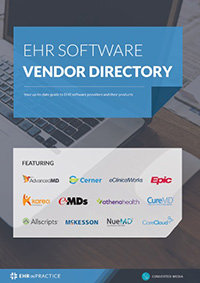Selecting a versatile EHR for family medicine
Family practices occupy a unique space in the healthcare industry in that must be prepared to serve a diverse patient population whose medical needs may vary significantly. Further, given the fact that these practices operate on a smaller scale when compared to members of larger health systems or larger independent ambulatory practices selection teams in family practices must also keep an eye on making sure an EHR can provide adequate ROI. Given the unique space in the healthcare industry, what should a family practice organization consider when selecting a family medicine EHR?
What are the EHR needs of a family medicine practice?
When considering the needs of a family medicine practice, a useful suggestion can be found in a recent study published in the Annals of Family Medicine. The study discussed the issue of burnout among physicians in family care. The study noted that physicians in these practices are more susceptible to EHR-related burnout due to extra time spent on their EHR. The study noted that family physicians spent nearly 2 hours on electronic health record (EHR) tasks per hour of direct patient care. The researchers discovered that these physicians spent more than one-half of their workday, nearly 6 hours, interacting with the EHR during and after clinic hours.
Accordingly, when selecting a family practice, EHR selection teams should consider paying attention to the areas the study noted as problem areas for physicians. The time these clinicians spent on their EHR was occupied mainly with clerical and administrative tasks including documentation, order entry, billing and coding, and system security accounted for nearly one-half of the total EHR time (157 minutes, 44.2%). From the information collected one can conclude that an EHR product should offer ease of use in these areas.
Unique EHR requirements for family medicine
Family medicine occupies a unique space in the healthcare industry in that they must be equipped to address a comparatively more diverse array of patients who may present to a practice a wide range of conditions. Accordingly, the type of clinical data collection and analysis and administrative functions a family practice must engage is different from many other areas of medicine.
Further, reinforcing this unique position, family practices also commonly are the first point of contact for a patient who will then likely be referred to other specialty practices or providers. Therefore, they must be able to share information seamlessly to ensure their patients are adequately served across multiple care setting. Lastly, family practices also face a competitive market in which their financial viability, according to Medical Economics, “Family physicians can thrive by embracing high-value, patient-centered care, coordinated among providers with the aid of technology and data exchange.” As such, family medicine practices must view EHR selection through the lens of improving efficiency, quality of care improvement, and interoperability.
An EHR for a family medical practice must be versatile from a design standpoint and a functionality standpoint. It must be versatile enough to accommodate the wide variety of clinical data a family practice will encounter. Further, a family medicine EHR must also be versatile from a functional standpoint in that it must easy to use, cost-effective, and easily modified if needed.
Free white paper

Top 10 Family Medicine EHR Comparison
Compare the top family medicine EHR systems on offer in our top 10 comparison

Featured white papers
-

Top 10 Family Medicine EHR Comparison
Compare the top family medicine EHR systems on offer in our top 10 comparison
Download -

EHR Vendor Directory
Get the most up-to-date directory of EHR software vendors. Find the best software for your practice.
Download -

EHR Pricing Guide
Get your complete guide to EHR software pricing and project costs. Your headstart on EHR pricing research
Download

